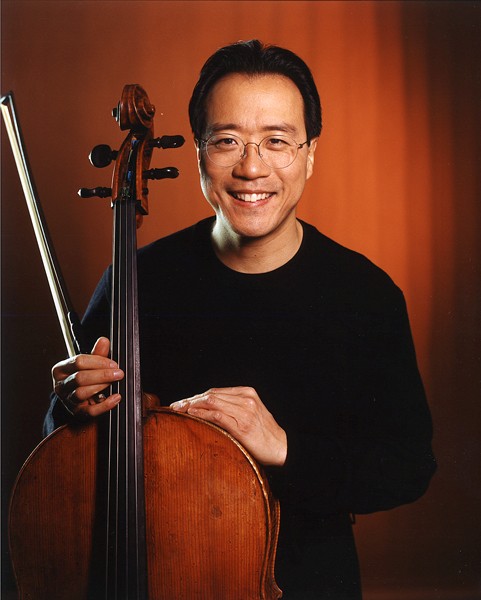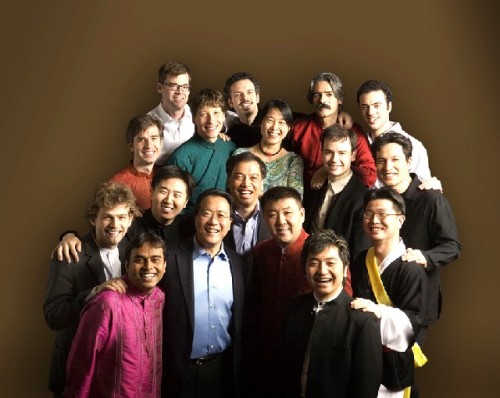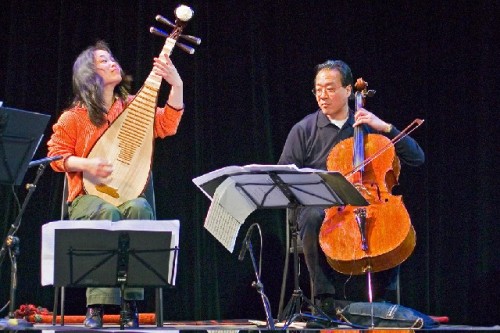On the Silk Road with Yo Yo Ma
The Silk Road Ensemble at Lincoln Center
By: Susan Hall - Jun 12, 2009
Yo Yo Ma and the Silk Road Ensemble
Alice Tully Hall
Lincoln, Center
New York, New York
June 5, 2009
The reimagined exterior of Alice Tully Hall in the
.
Yo Yo Ma introduced the first piece performed by his
Ma told us that he's started his own ascent on this very stage some 38 years ago and he was glad the stage couldn't tell stories. Many stories would be told this night during the concert.
Parables are tales told to make a point and "The Silk Road" ensemble itself is a parable -- bringing together musicians, composers and instruments of East and West and culturally diffusing to give a deep appreciation of our global community.
The audience chuckled and guffawed through the telling of "The Paths of Parables" accompanied by music. Baseball Hall of Famer Willie Stargell once remarked, "Opinions are like asses; everyone has one." Not everyone has an ass like the one whose story was told in "Paths of Parables." Children out way beyond bedtime loved the parable "The Father, the Son and the Donkey," in which developing your own opinion is the point, the exact opposite of Stargell's opinion. Ying and Yang. To and fro, East to West and back, this was the shape of the evening.
Another parable concerned a young boy who thought he could trick a master who answers even the trickiest questions without making a mistake. The boy catches a butterfly which he hides between his two hands. He asks the master to tell him whether the butterfly is alive or dead, planning of course to squish the butterfly to death if the master guesses that it is alive. The master thinks for a moment, and then says, "The answer, young man, is between your hands."
I thought of Gian Carlo Menotti who used to get up before an audience of parents and children when "Amahl" was performed and ask, "How many of you, like Amahl, have problems with your mothers?" Every young hand in the place shot up.
Ma did not ask if parents had the master's experience with their ever so bright children, but certainly my hand would have shot up if he had. But then the parable was called the "Answered Unanswered Question," a more Eastern subject than Mr. Menotti's.
Using words with music is tricky. In opera, we suspend disbelief when we walk into an Opera House, so the fact that a soprano will be killed by a poison purple violet or unborn children fry in a pan doesn't bother at all. But during this concert, when we're told that Angel Ham's piece called "Empty Mountain" is a nightmare about a Grandmother's mysterious disappearance set in screeching traffic and we hear something lovely and recessive, the disconnect bothers.
The
Often the performers danced as they played, particularly in the case of the first violinist and the sheng player, Wu Tong, who accordioned himself several times, pressing down to the floor and then expanding in a jump. These two brought down the house as did the self-drummer – drumming on his own chest.
Today bows for the stringed instruments are made of horsehair. Some of Ma's strings were flying loose around the bow, and I wondered if they were made of silk to honor his group -- silk, the beautiful but fragile hair rarely used because it so easily falls apart. But then, it could have been the vigor of the performance that loosed horse hair, whipped around by a cellist whose connection between feeling and its expression is so intense.
Reminders of Ferdy Grofe's clip clopping in the "Grand Canyon Suite" often dominated my ear – but the sound emerged was coming from a sheng, a pica, and a long flute.
Perhaps because gypsies are nomadic, the cadences of their music were heard throughout the concert. Even the Sicilian composer's "The Taranta Project", developed at a Tanglewood workshop, sounded like gypsy music at times and the actual "Music of Roma" concluded the program.
Encores were improvised, using instruments of East and West together, and the fun the performers had wafted out to the audience. Wafted may be the wrong word. It was launched out to us with clarity, affection and exuberance.
Every student has to pass a global history test to graduate from high school and there is one question that's always asked: What does the




